Makhdoom Ali Mahimi: The Revered Sufi Saint and Quranic Commentator of the Indian Subcontinent
Sufism, with its rich tradition of spiritual enlightenment, has played a vital role in shaping the religious landscape of the Indian subcontinent. The role of Sufis in establishing a peaceful and religious environment in the region is well-recognized. These Sufis, whether migrating from far-off lands or born in the Indian subcontinent, sought to spread the light of divinity among the native population.
Among the luminaries who graced this mystical journey, Hazrat Makhdoom Ali Mahimi stands as a beacon of spiritual wisdom and scholarly prowess. Renowned not only as a revered Sufi saint but also as one of the ealry Mufassirs (Quranic commentators) of the Indian subcontinent, his life unfolds a remarkable tapestry of devotion, intellect, and societal benevolence. A visionary scholar of the 8th century, Makhdoom Ali Mahimi earned recognition as a commentator of the Qur'an, bearing titles such as Qutb-ul-Aqtab, Alam Maani, and Maulana Qutb Burhani due to his spiritual, academic, and religious excellence.
His full name is Sheikh Imam Allama Aladdin Ali bin Ahmad Al-Shafi'i Al-Mahimi Al-Kokani, He was born in Mahim, a region in Mumbai, in the year 776 AH. His kunya was Abu Al-Hasan, his title was Zain Al-Din, and he was known as Makhdum Ali. He died in 835 AH and his grave is well-known in Mahim, Mumbai.
Childhood and Education
Hazrat Faqih Makhdoom Ali Mahimi was born in Mahim on the 10th of Muharram 776 AH (1372 AD). His ancestors migrated to Mahim from Hijaz in 252 AH (around 860 AD) to escape the oppression of Hajjaj bin Yusuf. Settling in Kalyan, Mumbai, Makhdoom Ali Mahimi was born into a noble family of Arabic descent, specifically from the Nawayit tribe, a branch of the Banu Hashim tribe. His father, Ahmed bin Ibrahim bin Ismail, was a scholar and a pious merchant married to Bibi Fatima, the daughter of Malik Utjar Nakhda Hussain Ankolia. Hazrat Makhdoom Ali's mother, Karima, was known for her noble character and piety. From his childhood, the light of Wilayat shone on him, and it is said that he acquired his Wilayat through the blessings of his mother.
Hazrat Mahimi, may Allah have mercy on him, acquired Islamic knowledge and studied the sciences of Shariah, including Quran, Hadith, Fiqh, Tafsir, Logic, and Philosophy at a young age. By the time he was nine years old, he had already gained considerable knowledge from his father, Sheikh Ahmed, may Allah have mercy on him, who was one of the prominent scholars and learned men of his time, proficient in both rational and transmitted sciences. However, his formal education with his father was cut short when his father passed away, leaving the young Sheikh Mahimi and his mother behind.
A few days after his father's passing, a sincere desire for acquiring inner knowledge and spiritual understanding blossomed in the young boy's heart. He was not content with the external knowledge he had gained and was driven by a remarkable longing and latent spark in his ambitious soul to engage in spiritual knowledge, self-purification, divine love, and quenching the thirst of the soul. Nevertheless, his mother was not willing to let him travel far from her sight and did not permit him to go to any other place for further education. She prayed to Allah, asking Him to provide her son with the means of acquiring knowledge, spiritual training, and proper conduct within their homeland. Allah answered her prayers, bestowing upon him both external and internal knowledge. It is said that he would go to the seashore and meet Khidr, peace be upon him, who taught him knowledge and wisdom ("The Life of Sheikh Makhdum Ali Mahimi," p. 14-15).
Mother’s Blessings
Hazrat Makhdoom Mahimi's character was marked by politeness and obedience from childhood. His devotion to serving his family was evident when one night, after Isha prayer, his mother felt thirsty. Despite her sleeping state, he stood all night with a bowl of water until the morning dawned. His mother's prayers played a crucial role in his spiritual journey, leading to his perfection in both external and internal sciences.
Strictly following the Sunnah, Makhdoom Ali Mahimi was enthusiastic about practicing hospitality, often decorating his table with a delicious banquet. His generosity and liberal nature extended to helping the needy openly, despite coming from a wealthy family. He attracted both Muslims and Hindus with his pleasing character and good behavior.
In Sufism, Hazrat Makhdoom Ali Mahimi was known as an Awasi, a title given to prominent Ulamas who learn from neither Shaykh nor Sufi. His noble character and deep understanding of God and His laws, both overt and covert, were evident in both cerebral disciplines and conventional ones. His principal disciple was Shaikh Muhammad Syed Kokani (R.A.).
WORKS
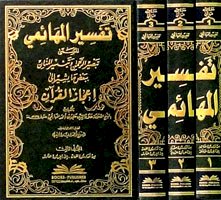
Hazrat Makhdum Ali Mahimi left behind numerous literary and religious works, with his groundbreaking commentary on the Quran, ‘Tafsir ar-Rahman’ being the most renowned. This commentary thoroughly explores the nuances between Quranic chapters and verses in an easy-to-read format, discussing both mystical and non-mystical elements. Despite the destruction of the Mahim Dargah's library, copies of his writings are found in libraries worldwide.
Allama Abdul Hayy Al-Hasani, listed the scholarly works of Sheikh Mahimi, stating: ". . . 'al-Zawarif fi Sharh al-Awarif,' and 'Mashra al-Khusoos fi Sharh al-Fusoos,' and 'Istijla al-Basar fi al-Radd 'ala Istiqsa al-Nazar' by Ibn al-Mutahhar al-Hilli, and 'al-Noor al-Azhar fi Kashf Sirr al-Qada wa al-Qadar,' and its commentary 'al-Daw' al-Azhar fi Sharh al-Noor al-Azhar,' and 'Ajlat al-Ta'eed fi Sharh Adillat al-Tawhid,' and a commentary on al-Fusoos that has no equal, and he wrote about the secrets of Fiqh and the merits of Shariah in a book called 'In'am al-Malik al-Allam bi-Ihkam Hukm al-Ahkam,' and he translated the book 'Lam'at al-Iraqi' and its commentary, and he translated the treatise 'Jam' Jahan Nama' and its commentary named 'Ara' al-Daqa'iq fi Sharh Mir'at al-Haqa'iq.' He also wrote refutations defending Sheikh al-Akbar and authored a treatise in Shafi'i Fiqh, along with other treatises." (Al-I'lam, vol. 3, p. 81).
Sheikh Ghulam Ali bin Noah al-Husseini al-Balkarami mentioned in "Subhat al-Murjan": "He has a remarkable treatise on the grammatical analysis of Allah's words: '﴿ الم * ذَلِكَ الْكِتَابُ لَا رَيْبَ فِيهِ هُدًى لِلْمُتَّقِينَ ﴾
TAFSIR: TABSIR AL RAHMAN
The tafsir, "Tabsir al Rahman," authored by Mahaimi, considered one of the masterpieces in the field of Quranic commentary by traditional Ulamas, goes into the deep insights of the Holy Quran. The name itself, Tabsir al-Rahman wa Taysir al-Manan bi-Ba'd Ma Yashir ila I'jaz al-Qur'an which means: "Insight of the Merciful and Facilitation of the Gracious with Some Indications of the Miraculous Nature of the Quran" signifies the 'insight of the Quran,' as Mahaimi aimed to reveal the miraculous nature of the Quran.
In his tafsir, Mahimi provides detailed explanations of the chapter titles and the importance of the Bismillah. He begins with historical context and addresses common misconceptions about tafsir. He categorizes each surah as either Makki or Madani, offering a brief introduction before delving into the tafsir itself. His focus on the interpretation of the Quran through the lens of the Sunnah and renowned Ulamas underscores his scholarly rigor.
Mahimi's reverence is evident in his departure from the tradition of favoring personalities over knowledge. His exegesis incorporates Tafsir bi'r-Ra'y, emphasizing independent reasoning within the bounds of Sharia Law.
Mahimi's commentary is noted for its accessibility and depth, making complex theological concepts understandable to a broader audience. His approach includes detailed explanations of the Quranic chapters' titles, the significance of Bismillah, and the reasons for revelation (Asbab al-Nuzul). Mahimi's work bridges traditional Islamic scholarship with insights from Sufi mysticism, providing a comprehensive perspective on the Quran.
CONCLUSION
Hazrat Makhdoom Ali Mahimi is deeply revered by people from all walks of life. During his annual ten-day Urs festival hundereds visit his dargah. The highlight is a grand procession from the Mahim Police Station, believed to be his residence. This includes two officers from each of Mumbai's eighty-four police stations, underscoring the historical bond between the saint and the police.
A representative of the Mumbai police offers the first "chaddar" (shawl) at his tomb. Legends tell of a constable who gave water to the dying saint and miraculous assistance from the saint in fighting smugglers.
Adjacent to the senior inspector's office at the Mahim Police Station is a room containing the saint's preserved belongings, including his chair, sandals, and hand-written Qur'an, which are displayed to the public annually during the Urs. In 1920, a senior British inspector, Raymond Esquire, purchased the cupboard holding these items as a tribute to the saint.
It’s said the Mumbai police personnel visit his grave and seek his blessings, especially when dealing with difficult cases.
On May 21, 2005, the Maharashtra government named the JJ Flyover after Hazrat Makhdoom Ali Mahimi, commemorating his legacy with the country's longest viaduct at 2.1 kilometers.
In conclusion, Hazrat Makhdoom Ali Mahimi's life exemplifies spiritual devotion, intellectual excellence, and societal benevolence. As a revered Sufi saint and the first Mufassir of the Indian subcontinent, his legacy endures through his profound commentary on the Quran, leaving an indelible mark on generations to come.
For more reference and details, you may check out:
- Hidayat al Aarifin (V.1 pg.388)
- Idah al Maknun (52, 614, 651)
- Tarkarli, Al-Aalam (7\10)
REFERENCES
- Tabsir al Quran pg. 3
- Abdu Sattar Dalvi, Kakan Kakani Musalman and Urdu, Mumbai, Gazzal pg. 7
- Muhammad Abdullah Mama Paro, The Life History of Hazrat Sheikh Makhdum Ali Paro, pg, 10-11
- Qiyadh Ahmed Barkati, (Imam of Masjid al Makhdoomiyah), Muqabalatun Shakhshiya, Mumbai published: 2014-14-20a
- Allama Al-Hasani, Abdul Hayy, "Al-I'lam bi-Man fi Tarikh al-Hind min al-A'lam"
Minnath Alam is a research scholar at Darul Huda Islamic University in the department of Study of Religion, currently pursuing a degree in English Language and Literature. One of his hobbies is to write occasionally on special days, and raising issues related to public interest.
E-mail Id: minnathalamsuraj@gmail.com
Disclaimer
The views expressed in this article are the author’s own and do not necessarily mirror Islamonweb’s editorial stance.

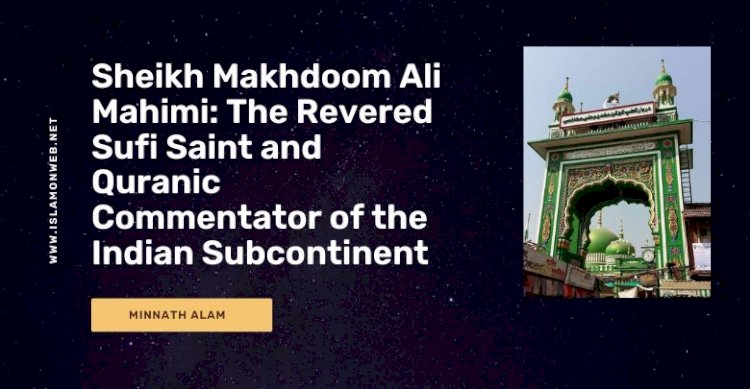



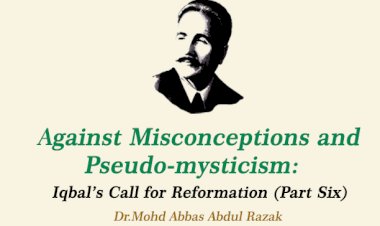

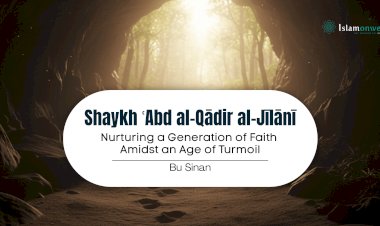
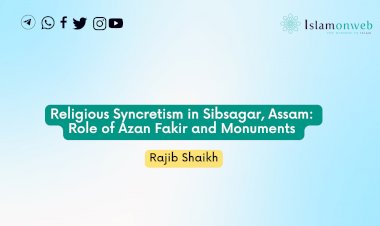
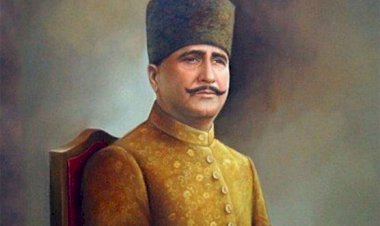
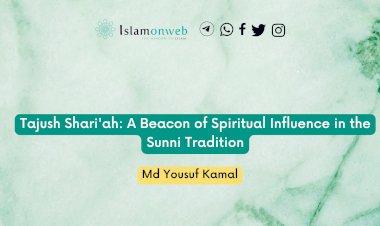














Leave A Comment